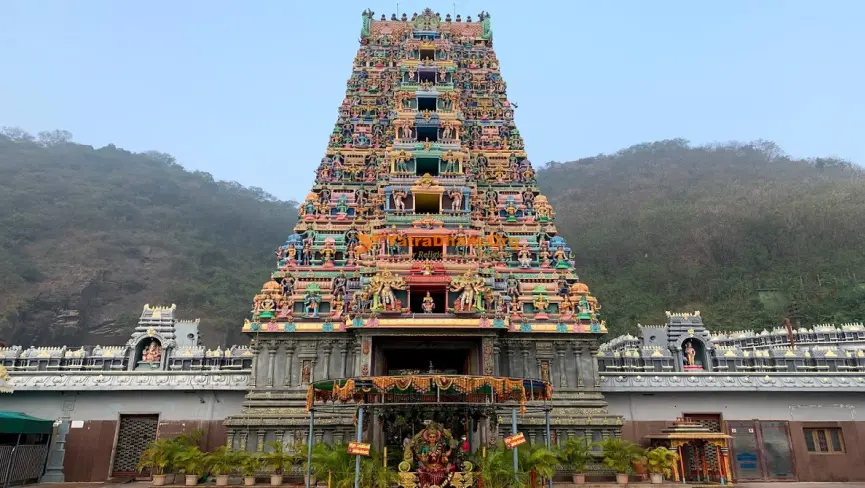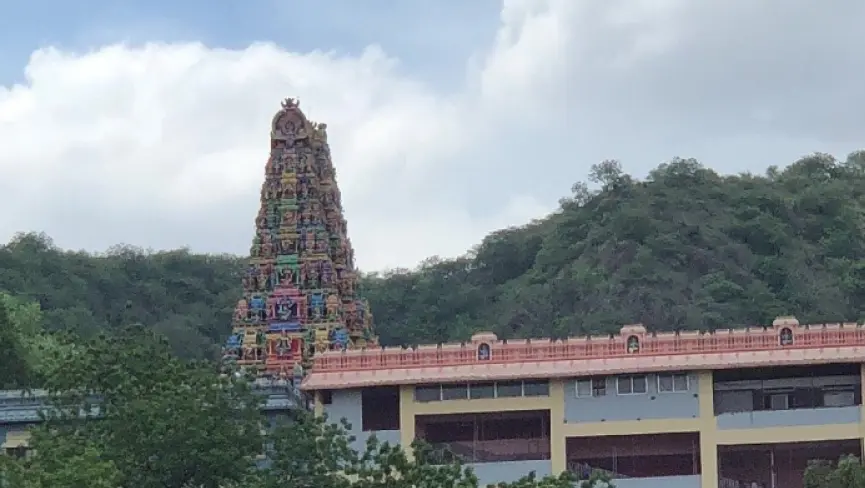
Navratri Celebrations at Kanaka Durga Temple Vijayawada
The Kanaka Durga Temple in Vijayawada is one of the most famous Shakti Peethas in South India, situated on the sacred Indrakeeladri Hill overlooking the Krishna River. Among all festivals celebrated here, Navratri holds special significance, attracting lakhs of devotees from across India. The temple is beautifully decorated during these nine days, and devotees get a divine experience of Goddess Kanaka Durga in different Alankaras (forms) each day.
Significance of Navratri at Kanaka Durga Temple Vijayawada
The Navratri festival at Kanaka Durga Temple Vijayawada holds immense spiritual and cultural importance. It is believed that Goddess Kanaka Durga, residing on the sacred Indrakeeladri Hill, blessed sage Indrakila after he performed severe penance, hence the hill is named after him. During Navratri, devotees worship the goddess in nine different alankaras (forms), each representing a unique aspect of feminine energy – Shakti, knowledge, wealth, and protection.
Navratri also commemorates the victory of Goddess Durga over the demon Mahishasura, symbolizing the eternal triumph of good over evil. Lakhs of devotees throng the temple during these nine days to seek the goddess’s blessings for health, prosperity, and protection from negative forces.
At Vijayawada, Navratri is not just a festival but a spiritual journey where rituals like Chandi Homam, Kumkumarchana, and Suvasini Puja enhance the divine atmosphere. The celebrations culminate with Vijayadashami (Dasara), marking the goddess’s victory, and devotees participate in the grand Teppotsavam (boat festival) on the Krishna River.
Navratri Daily Alankaras at Kanaka Durga Temple Vijayawada
One of the most unique traditions of the Kanaka Durga Temple Vijayawada during Navratri is the daily alankaras (decorations) of the goddess. Each day of the nine-day festival, Goddess Kanaka Durga is adorned in a different form (avatar), representing her various divine powers. This is considered highly auspicious, and thousands of devotees visit the temple each day to witness the goddess in these magnificent alankaras.
List of Navratri Alankaras (Day-wise)
-
Sri Swarna Kavachalankruta Durga Devi – Adorned in golden armor symbolizing prosperity and strength.
-
Sri Bala Tripura Sundari Devi – Depicts the goddess in her youthful, divine form representing purity.
-
Sri Gayatri Devi – Embodiment of knowledge and wisdom.
-
Sri Lalitha Tripura Sundari Devi – The universal mother, symbolizing grace and power.
-
Sri Annapurna Devi – Provider of food, nourishment, and prosperity.
-
Sri Mahalakshmi Devi – Goddess of wealth, fortune, and well-being.
-
Sri Saraswati Devi – Goddess of learning, arts, and wisdom.
-
Sri Durga Devi – Fierce form symbolizing courage, protection, and destruction of evil.
-
Sri Mahishasura Mardini Devi – Final and most powerful form, representing the goddess’s victory over Mahishasura, celebrated on Vijayadashami (Dasara).
Daily Pujas During Navratri at Kanaka Durga Temple Vijayawada
The Navratri celebrations at Kanaka Durga Temple Vijayawada are marked with grand rituals, spiritual fervor, and vibrant festivities. Each day, special alankaras (decorations) of the goddess are performed, along with elaborate pujas and homams that attract lakhs of devotees. The temple on Indrakeeladri Hill becomes the center of devotion, where every ritual is believed to bestow blessings of health, prosperity, and protection.
Daily Pooja Schedule During Navratri
-
Suprabhata Seva (4:00 AM – 4:30 AM) – The goddess is awakened with Vedic chants and devotional hymns.
-
Special Alankaram (5:00 AM – 6:00 AM) – Each day, the goddess is adorned in a unique avatar such as Sri Swarna Kavachalankruta Durga, Sri Annapurna Devi, or Sri Mahalakshmi Devi.
-
Archana & Kumkumarchana (6:30 AM – 11:00 AM) – Devotees participate in archana and offer kumkum to the goddess for family welfare and prosperity.
-
Maha Naivedyam (12:00 PM) – A grand food offering is made to Goddess Kanaka Durga, later distributed as prasadam.
-
Afternoon Darshan (1:00 PM – 4:30 PM) – Continuous darshan for devotees with regular poojas.
-
Chandi Homam & Sahasranama Archana (5:00 PM – 7:00 PM) – Special rituals conducted to invoke divine blessings and remove obstacles.
-
Deeparadhana (7:00 PM – 8:00 PM) – Evening lamp worship with devotional songs and bhajans.
-
Ekantha Seva (9:00 PM – 9:30 PM) – Final ritual where the goddess is put to rest with lullabies.

